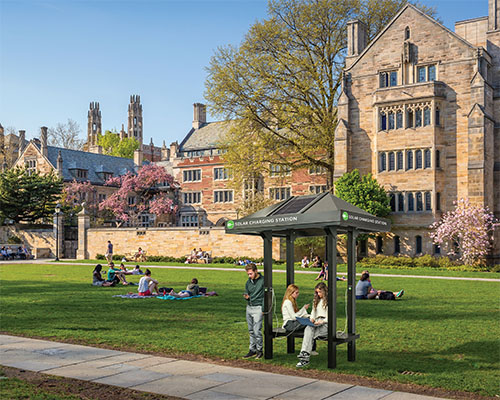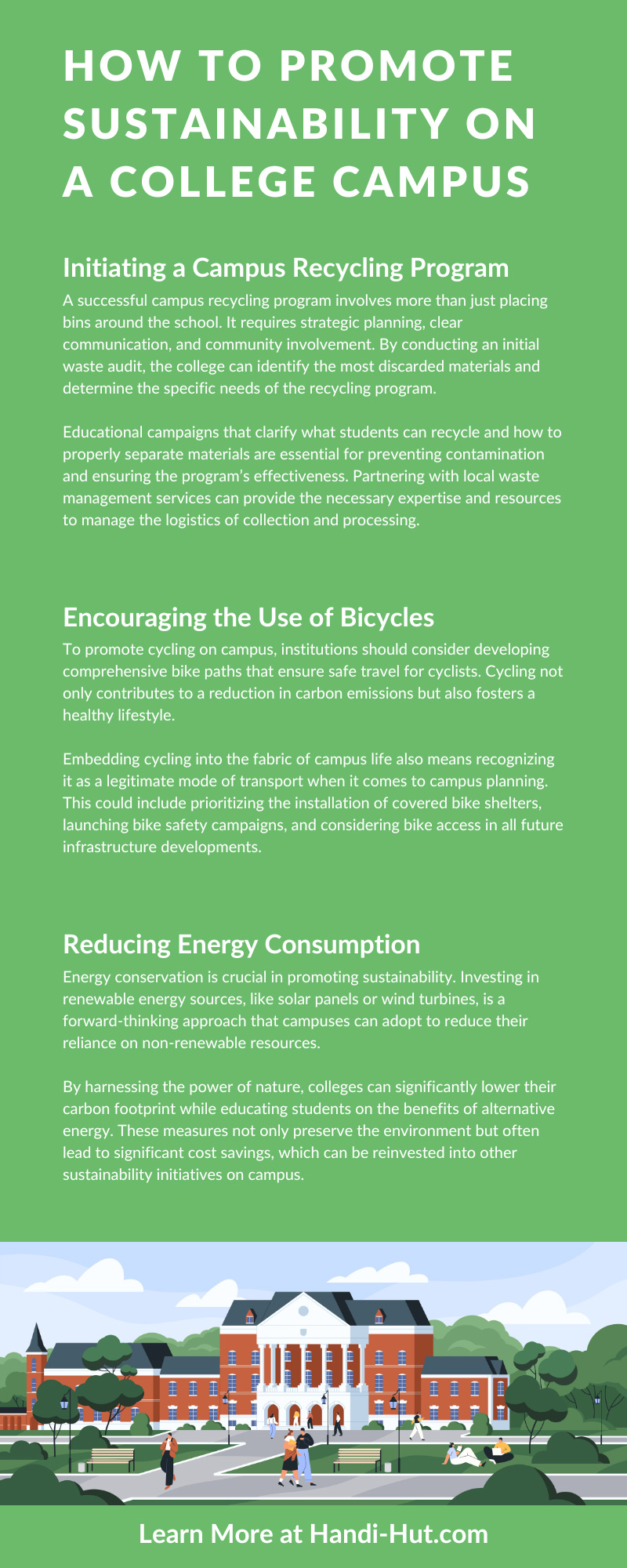
College campuses are buzzing hubs of activity, where the energy of youth meets the pursuit of knowledge. This makes college campuses ideal breeding grounds for innovative ideas aimed at promoting a sustainable future. As the urgency of environmental awareness becomes ever more apparent, institutions of higher learning must take the lead in modeling sustainability practices.
With the right strategies, a college campus can transform into a microcosm of efficiency and environmental responsibility, educating and inspiring the next generation to prioritize the health of the planet. By integrating sustainability into its core values, a college not only better serves its students and staff but also contributes to the broader fight against climate change and environmental degradation.
Understanding how to promote sustainability on a college campus will allow you to create a functional environment, prompting other organizations and communities to adopt similar practices.
Cultivating a Green Mindset
Promoting a sustainable campus extends beyond the classroom walls and into the heart of student life. Initiatives such as Green Weeks and sustainability pledges encourage active participation and daily habit changes among the campus community.
Through hands-on involvement in sustainability projects, like campus gardens or energy-saving campaigns, students can connect the theoretical knowledge from environmental courses to practical, impactful actions. Colleges can also promote this green mindset by providing generous incentives for sustainable behaviors, such as discounts at campus stores for utilizing reusable bags or containers.
Initiating a Campus Recycling Program
A successful campus recycling program involves more than just placing bins around the school. It requires strategic planning, clear communication, and community involvement. By conducting an initial waste audit, the college can identify the most discarded materials and determine the specific needs of the recycling program.
Educational campaigns that clarify what students can recycle and how to properly separate materials are essential for preventing contamination and ensuring the program’s effectiveness. Partnering with local waste management services can provide the necessary expertise and resources to manage the logistics of collection and processing.
Encouraging the Use of Bicycles
To promote cycling on campus, institutions should consider developing comprehensive bike paths that ensure safe travel for cyclists. Cycling not only contributes to a reduction in carbon emissions but also fosters a healthy lifestyle.
Embedding cycling into the fabric of campus life also means recognizing it as a legitimate mode of transport when it comes to campus planning. This could include prioritizing the installation of covered bike shelters, launching bike safety campaigns, and considering bike access in all future infrastructure developments.
Reducing Energy Consumption
Energy conservation is crucial in promoting sustainability. Investing in renewable energy sources, like solar panels or wind turbines, is a forward-thinking approach that campuses can adopt to reduce their reliance on non-renewable resources.
By harnessing the power of nature, colleges can significantly lower their carbon footprint while educating students on the benefits of alternative energy. These measures not only preserve the environment but often lead to significant cost savings, which can be reinvested into other sustainability initiatives on campus.
Promoting Green Transportation
Promoting green transportation extends to encouraging the use of electric vehicles (EVs) and facilitating pedestrian movement. By installing electric vehicle charging stations throughout campus, colleges demonstrate their commitment to sustainable transport and cater to the growing number of students and faculty adopting EVs.
Meanwhile, installing walkway covers not only makes walking a more viable and pleasant option regardless of weather conditions, but it also subtly features the institution’s dedication to a pedestrian-friendly campus. Further measures could include partnerships with local transit to provide discounted passes for buses or trains, making public transport a more attractive option for the college community.
Implementing Water Conservation Measures
Implementing water conservation measures requires a strategic blend of technology, policy, and community engagement. Conducting a water audit can unveil current usage patterns and identify areas where water-saving modifications are necessary. The installation of low-flow fixtures in bathrooms, kitchens, and labs across campus can significantly reduce water usage without impacting functionality.
Educational efforts must accompany these technological changes to foster a culture of conservation. Awareness programs about water economy and practical ways to save water, like turning off taps when not in use or reporting leaks, can have a substantial effect.
Establishing Sustainable Dining Halls
Sustainable dining halls are pivotal in nurturing eco-friendly habits and responsible consumption among students. Menus structured around seasonal and locally sourced products not only support regional agriculture but also cut down on greenhouse gas emissions associated with transporting food items long distances.
By providing a variety of vegetarian and vegan options, dining services can cater to diverse palates while also reducing the environmental impact of meat production. By promoting sustainability on college campuses with conscious and transparent decisions in their dining operations, colleges can promote a lifestyle that extends well beyond campus life.
Engaging in Community Gardens
Community gardens on campus serve as a connection between sustainability and education, offering students a unique opportunity to engage with the soil and learn about local flora and crop cycles. These green spaces can provide practical learning experiences about sustainable agriculture practices, composting, and biodiversity.
More than just educational tools, these gardens also promote well-being and create a sense of community. They can become gathering points where students and faculty collaborate, sharing knowledge and celebrating the fruits of their labor.
Facilitating Renewable Energy Projects
Investing in renewable energy projects, like solar panels or wind turbines on campus buildings, can cut down on greenhouse gas emissions and serve as learning resources. By integrating these technologies into science and engineering curricula, colleges can offer hands-on learning experiences that are invaluable for students.
Colleges should also prioritize showcasing energy generation and savings data to the community, further promoting transparency and serving as a visual reminder of the institution’s commitment to sustainability. Through these efforts, renewable energy projects become not only a source of clean power but also a catalyst for wider educational and community engagement.
Encouraging Sustainable Research
Encouraging sustainable research among students and faculty is imperative for fostering an academic culture of innovation and environmental responsibility. Institutions can advance this mission by creating sustainability research grants, scholarships, and fellowships targeted at investigating and addressing urgent ecological issues.
These funds can go toward theoretical research but also for practical projects that attempt to solve local or global challenges. Interdisciplinary research that pools expertise from various departments, such as environmental studies, engineering, business, and social sciences, can tackle sustainability from multiple angles.
By implementing these strategies, colleges can foster environments that not only educate students about sustainability but also practice it in every aspect of campus life. With a collective effort on campus, smaller-scale sustainability practices can lead to global changes, helping to secure a healthier planet for future generations.

